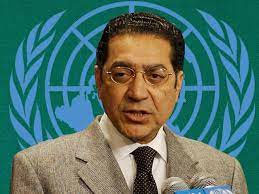United Nations
The President of United Nations Economic and Social Council (ECOSOC), Pakistani Ambassador Munir Akram, has warned that by 2050 more than half of the world’s population would be at risk due to water stress, and called for a multilateral response to deal with the challenge.
“Desertification alone threatens the livelihoods of nearly one billion people in about 100 countries,” Ambassador Akram told a special event on Sustainable Development Goal no. 6 , which is about “clean water and sanitation for all”. It is one of 17 anti-poverty Sustainable Development Goals (SDGs) established by the United Nations General Assembly in 2015.
The event was part of the ongoing high-level political forum on sustainable development (HLPF), which is being held under the auspices of ECOSOC.
In his opening remarks, the ECOSOC president also said intense water scarcity might displace as many as 700 million people by 2030.
The critical importance of water, he said, has been highlighted further by the coronavirus pandemic.
Access to safe drinking water, adequate sanitation and hygiene have been the first line of defence against coronavirus, which is particularly an acute requirement for developing countries, especially until the vaccine becomes available to all, Ambassador Akram said.
Yet, he said, three billion people around the world — almost 40 per cent of the global population — and two out of five health care facilities, lack adequate access to hand hygiene facilities.
Over the last 20 years, Ambassador Akram said the overwhelming majority of disasters, almost 90 percent, have been weather-related events.
Noting that 40 percent of the world’s population lives within shared river basins, the ECOSOC chief said without effective transboundary water cooperation, the potential for threats to peace and security were ever present.
“Water and climate are tied through the hydrological cycle,” he said adding, “Climate change and associated changes in the hydrological cycle will lead to biodiversity loss.”
“Lack of investment in water infrastructure leads to significant, economic, social and environmental losses,” he told the meeting.
Citing the Organization for Economic Co-operation and Development (OECD), the ECOSOC chief said the total financing needed between 2016 and 2030 for transition to a water-secure world could require additional annual investments of US $ 500 billion.
Global estimates for financing this water transformation range from US $ 6.7 trillion by 2030 to US $ 22.6 trillion by 2050.
Investments were needed not only to build new infrastructure but also to maintain and operate existing facilities, the Pakistani envoy said, warning that failure to improve water resource management could diminish national growth rates by as much as six percent of by 2050.
“While the present sources of international finance and investment are important, governments must explore new and innovative approaches for investment in environmentally sustainable water and sanitation-related infrastructure,” Ambassador Akram said.
In this regard, he said, the UN could help the developing countries in identifying, formulating and offering reliable projects for water and other infrastructures essential to financing through public and private partnership.—APP










